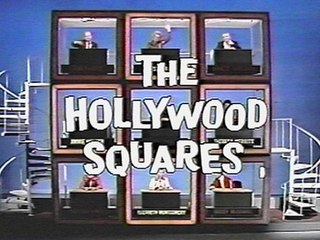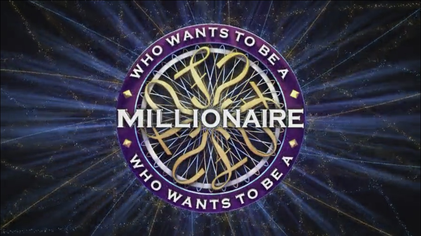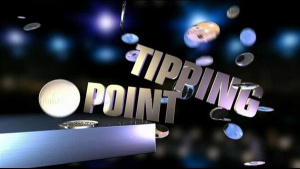
Hollywood Squares is an American game show in which two contestants play tic-tac-toe to win cash and prizes. The show piloted on NBC in 1965, and the regular series debuted in 1966 on the same network. The board for the game is a 3 × 3 vertical stack of open-faced cubes, each occupied by a celebrity seated at a desk and facing the contestants. The stars are asked questions by the host, and the contestants judge the truth of their answers to gain squares in the right pattern to win the game.
Family Fortunes is a British television game show based on the American game show Family Feud. The programme ran on ITV from 6 January 1980 to 10 January 2003, before being revived by the same channel in 2006 under the title All Star Family Fortunes.

Eye Guess is an American game show created by Bob Stewart and hosted by Bill Cullen, which aired on NBC from January 3, 1966, to September 26, 1969. The game combined a general knowledge quiz with a Concentration-style memory element, where the answers were shown to the players and their recall of their positions was tested.
3–2–1 was a British game show that was made by Yorkshire Television for ITV. It ran for ten years, between 29 July 1978 and 24 December 1988, with Ted Rogers as the host.
Bognor or Bust was a 2004 UK television panel game, on the subject of news and current affairs. Produced by 4DTV for ITV, the show conventionally gave contestants the opportunity to win prizes, yet was comedic in style. It combined members of the public and celebrities on the same panel.
Idiot Savants was an American television game show on the MTV network which ran from December 9, 1996 to April 25, 1997. It was created by Michael Dugan and Chris Kreski, directed by Steve Paley, and hosted by comedian Greg Fitzsimmons.

Celebrity Squares is a British comedy game show based on the American comedy game show Hollywood Squares. It first ran from 20 July 1975 to 7 July 1979 and was hosted by Bob Monkhouse, then from 8 January 1993 to 3 January 1997 and was also hosted by Monkhouse.
Going for Gold was a British television game show that originally aired on BBC1 between 12 October 1987 and 9 July 1996. It was revived for Channel 5 from 13 October 2008 to 20 March 2009.
Fandango is a country music-themed quiz show which aired on TNN from March 8, 1983 to March 31, 1989, when it was replaced by Top Card. Fandango was the first TV game show to air on TNN and was one of the longest-running game shows on a cable network.

Who Wants to Be a Millionaire? is a British television quiz show, created and produced by David Briggs, and made for the ITV network. The show's format, devised by Briggs, sees contestants taking on multiple-choice questions, based upon general knowledge, winning a cash prize for each question they answer correctly, with the amount offered increasing as they take on more difficult questions. To assist each contestant who takes part, they are given lifelines to use, may walk away with the money they already have won if they wish not to risk answering a question, and are provided with a safety net that gives them a guaranteed cash prize if they give an incorrect answer, provided they reach a specific milestone in the quiz.
Connections is a British game show that aired on ITV from 13 May 1985 to 6 June 1990. The daytime version is hosted by Sue Robbie from 1985 to 1988 and Simon Potter from 1989 to 1990, while the primetime version is hosted by Richard Madeley.
Rodeo Drive is a cable game show that pitted three contestants against each other in a game based on the street of the same name. It was recorded in CBS Television City's Studio 43 in Los Angeles.

Gameshow Marathon is an American television program which aired on CBS from May 31 to June 29, 2006. It is based on the United Kingdom series Ant & Dec's Gameshow Marathon which aired on ITV in 2005. It also aired in Canada on CTV.
On the Cover is a game show that premiered on PAX TV on May 17, 2004. It was hosted by Mark L. Walberg and the announcer was Mitch Lewis.
Sale of the Century is a British game show based on a US game show of the same name. It was first shown on ITV from 9 October 1971 to 6 November 1983, hosted by Nicholas Parsons. Special edition Celebrity Sale of the Century aired occasionally, starting on 2 January 1981 with Steve Jones as a host. The first series was supposed to air only in the Anglia region, but it rolled out to other regions since 8 January 1972 and achieved full national coverage by the end of 10 May 1975, at which point it was one of the most popular shows on the network – spawning the often-mocked catchphrase "and now, from Norwich, it's the quiz of the week." Since Norwich was considered something of a backwater compared to London, it was often used ironically.
Rumor Has It was a daily game show that aired on the cable station VH1 from June 7 to October 28, 1993. Brian O'Connor was the host and John Ten Eyck announced.

The Chase is a British television quiz show broadcast on ITV and hosted by Bradley Walsh. Contestants play against a professional quizzer, known as the "chaser", who attempts to prevent them from winning a cash prize. The chasers are Mark Labbett, Shaun Wallace, Anne Hegerty, Paul Sinha and Jenny Ryan. Labbett and Wallace have both been chasers since series 1, while Hegerty joined in series 2, Sinha in series 4 and Ryan in series 9.

Fifteen to One is a British general knowledge quiz show broadcast on Channel 4. It originally ran from 11 January 1988 to 19 December 2003 and had a reputation for being one of the toughest quizzes on TV. Throughout the show's original run, it was presented and produced by William G. Stewart. Thousands of contestants appeared on the programme, which had very little of the chatting between host and contestants that is often a feature of other television quiz shows.

Tipping Point is a British television game show which began airing on ITV on 2 July 2012, and is presented by Ben Shephard. Four contestants answer general knowledge questions to win counters which they use on a large coin pusher arcade-style machine. Only the winner at the end has a chance to take home any money; the others leave with nothing except any non-cash prizes they may have won during the game.













